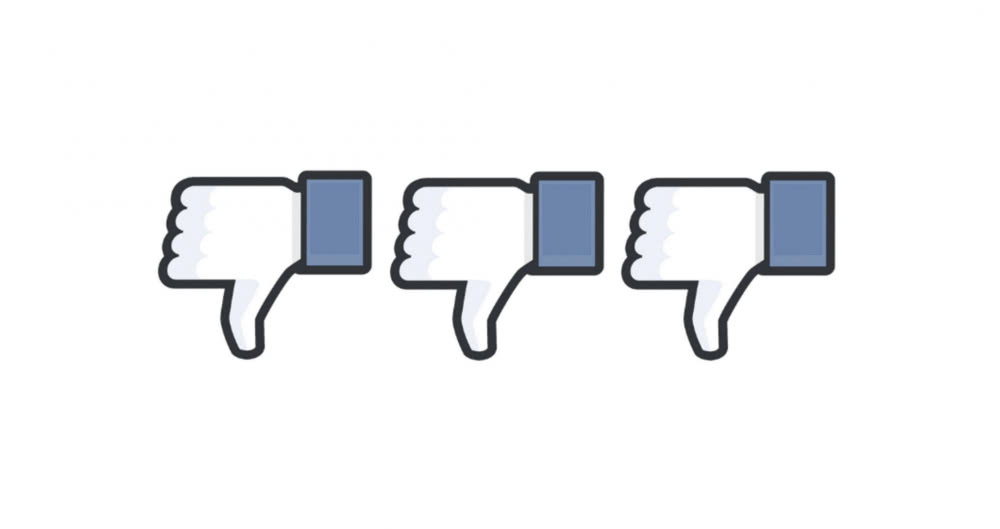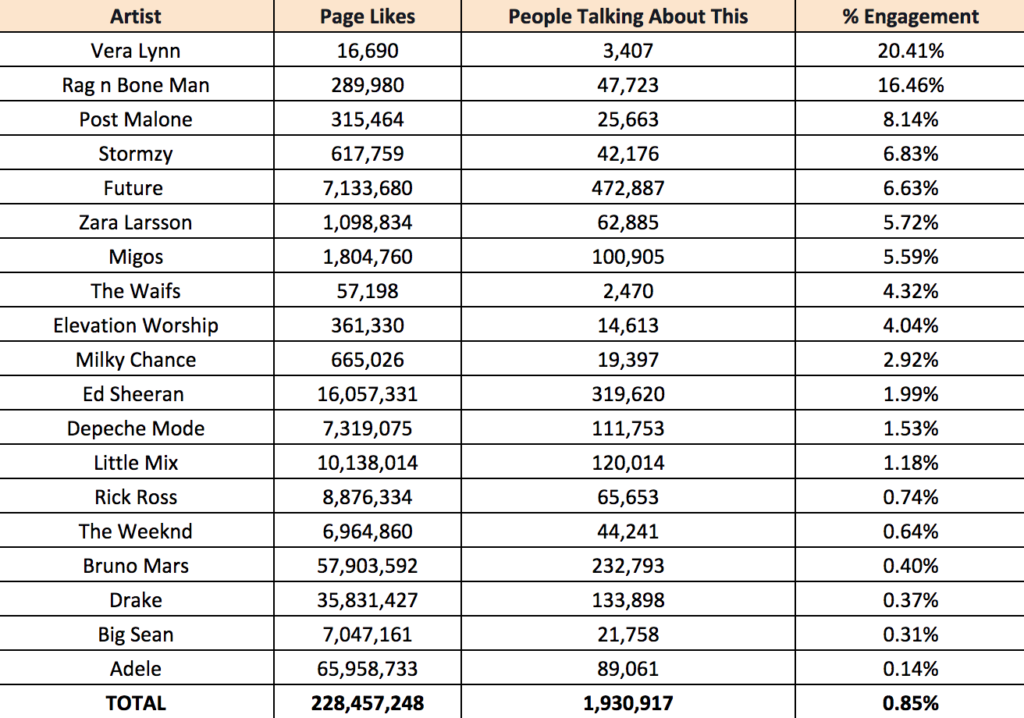Op-Ed: Facebook is failing artists, here’s the proof

For a long time, the music industry was on to a good thing with Facebook. The social media giant clamoured after artists knowing that those artists would bring huge fan bases along with them. Facebook offered a more interactive, shareable, and exciting method of connection than anything before it. And thanks to the music industry being early adopters and innovators on the platform – they were there early enough to enjoy reaching all of their fans without paying to boost posts.
Happy days forever right? Not quite.
Fundamentally, Facebook cares about their business – not your band, label, or artist. Organic reach (the number of your followers reached without paying to boost a post) is inversely related to profitability: the less free reach Facebook provides, the more paid posts they secure.
The music industry spent years, countless hours, and endless budgets building up fan bases on Facebook, naively assuming the free reach would continue. It didn’t, and there was an uproar when this started to change. Turns out they forgot Facebook was a business. One that needed to prove to Wall Street they could turn all of those users into bottom line profit. The music industry made a tragic mistake in trusting that Facebook activity would always be free. It was their fault, and they’re literally still paying for it.
It’s no secret that Facebook no longer displays all of your posts to all of your fans. In fact it has been estimated that organic reach is now as low as 2.27%, and in 2016 that was down 52% year on year. Competition for space in newsfeeds just keeps getting hotter and hotter.
Those page ‘likes’ you are so proud of? They have quickly become unreachable fans — unless, of course, you have the budget to boost your posts (which not all bands, labels, or managers can afford to do for every single post). Why do I have to pay to reach MY fans? They’re mine! No, they’re Facebook’s. And Facebook have publicly stated that they are not going to help artists reach all of their fans organically, even though fans are dying to see this content in their newsfeed.
Early last year, Facebook tested customisable news feed categories, which included music. This enabled users to filter their newsfeed to only see music updates; which in theory sounds great. Those categories miraculously disappeared soon after, with no word on why.
Even worse is the fact that the more ‘likes’ your page gets, the worse your organic reach becomes. It’s not a great incentive for a band to continue to grow its following on Facebook. However, Facebook is where the majority of music fans are found. And ultimately, the more ‘likes’ you drive to your page, the more you value your efforts on Facebook, and the more obliged you become to want to pay to reach your fans through the platform.
And things are getting worse rather than better. Last year some changes were made to the newsfeed, re-prioritising your real friends above the pages you like. Whilst this makes sense from a user’s perspective, it’s a tough pill to swallow for artists who have spent years building up a following on the platform.
Even when your organic reach is at a point where your content appears in one of your fan’s newsfeeds, you are up against cat videos, food porn, memes, and selfies. For an artist, that’s not considered time for their creative output. It’s throw-away content lost in a feed that moves faster than ever before. Facebook is not a music only platform, and it’s not a music first platform; it’s a content engine that doesn’t care how much your fans like your artist. For marketing departments, the pressure to create compelling content and pay for it to be seen is more than ever before.
But we can’t blame Facebook; our busy newsfeed is simply a victim of the company’s own success. More than 30 billion pieces of content are shared across Facebook each and every MONTH. Facebook can’t show us everything, and it makes perfect sense that the platform would become a ‘pay to play’ environment. But it doesn’t hurt to understand and take a deeper look at how this is hurting the music industry.
There isn’t much in the way of engagement benchmark stats for the music industry on Facebook specifically, so we’ve run some analysis ourselves. Luckily, you can see the engagement level for any Facebook page by clicking on the ‘likes’ of a particular page. The ‘people talking about this’ metric is the number of people who have interacted with a Facebook page in some way — liked, commented, shared etc. Simple, easy, and publicly available.
We looked at Facebook pages for those artists in the top 15 Album chart positions across the US, UK, and Australia (w/c 27th March, 2017).
Artists who are charting should be the most active on Facebook, are more likely to have money to spend on posts, and should ultimately have the highest engagement rates as a result. This is by no means a robust sample, but at least provides some insight into the reach and engagement experienced by a selection of different artists with different sized followings. Here are the numbers ranked by % engagement:


The numbers tell a clear story: on average artists are seeing 0.85% engagement on their posts. Engagement gets as low as 0.14%, and typically the more followers you have, the less engagement you get. ‘Likes’ then really have become nothing more than a vanity metric. It’s nice to see your ‘likes’ grow, but don’t be fooled into overstating the marketing value of this number.
You’d think artists would be winning on Facebook – they have fans wh0 are desperate for their content. But is Facebook still the first place you hear that your favourite artist has announced a new album? And how does that look when you like hundreds of artists? Facebook will always be an important component to any digital marketing for an artist, but it’s not nearly as easy as it once was.
This is a guest post by Ronan Mason, the co-founder of MuzeRoom. MuzeRoom feeds you curated music news, new releases, and music videos – but only for the artists you truly care about.
This article originally appeared on The Industry Observer, which is now part of The Music Network.


































